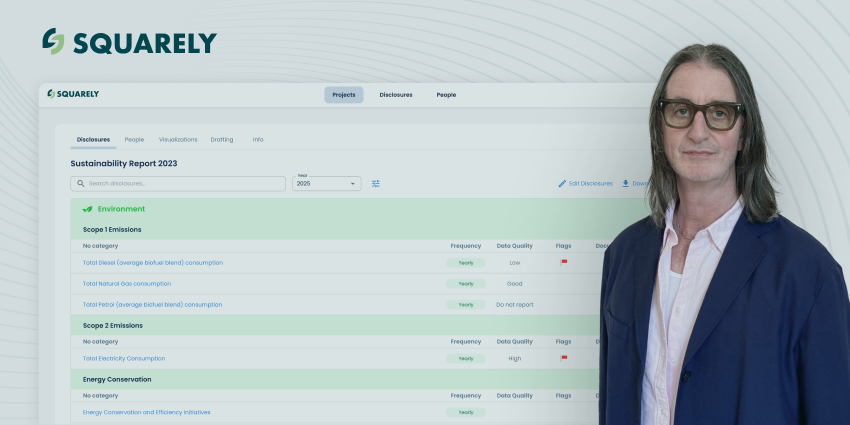How ESG Technology Can Prevent Greenwashing
Blockchain technology has now become a promising tool in preventing greenwashing as it aids in creating immutable ESG data records. The technology ensures that the data being recorded and entered cannot be changed or tampered with.
Lately, ESG criteria have become pivotal for evaluating the impacts of businesses. Regulators, consumers and investors are increasingly demanding accountability and transparency in ESG practices. The growth of ESG, however, has also brought with it a myriad of challenges in the realm of greenwashing, where companies falsely claim their ESG efforts and initiatives. In a bid to prevent that, ESG reporting technologies have been on the rise, many deeming it a powerful tool in the fight against greenwashing. This article explores how such advancements in ESG technology can thwart greenwashing and facilitate genuine sustainability initiatives and efforts.
What is Greenwashing?
Greenwashing is the act of making misleading and/or ingenuine claims about the environmental impacts of a company practices, product or service. These range from ambiguous to overtly exaggerated claims. It downplays the credibility of ESG and can misinform investors, regulators and consumers alike.
What is ESG Reporting Technology?
ESG reporting technology is a set of digital tools and platforms tailored to collect, assess and report data on a company’s ESG performance. These tools capitalise on technological advancements such as AI, blockchain, big data and Internet of Things (IoT) to provide reliable, verifiable and accurate ESG information and insights.
Great! But How Can ESG Reporting Technology Prevent Greenwashing?
- Provide Accurate and Reliable Data:
Simply put, what sets ESG reporting technology apart is its ability to improve the accuracy and transparency of the data provided. Traditional ESG reporting usually involves self-reporting mechanisms which can allow for biased or inaccurate data to be presented. ESG reporting technology, however, leverages automated data collection from a number of sources. ESG reporting technologies vary; some focus on strictly gathering and organising data, requiring manual report creation. Others, such as Sustainable Square’s SQUARELY, rely on AI to automate both data collection and report drafting, providing comprehensive and efficient reporting solutions. This type of automation can significantly reduce human error and bias, presenting data that is reliable and transparent.
- Data Analysis Using AI and Machine Learning:
Both Machine Learning and AI can evaluate and process vast amounts of data, detect anomalies and produce insights. These tools can pick up on any inconsistencies that could arise or ones that could be considered greenwashing. For example, if an organisation claims that it has engaged in significant reduction in carbon emission when the data shows otherwise, AI can easily pick up on such anomalies to further be assessed and investigated. This innovative tool can help ensure the integrity of the data being assessed.
- Real Time Monitoring and Reporting
ESG technology can be a great tool in providing real time monitoring and reporting of various ESG metrics. For example, many organisations opt to utilise IoT sensors to track environmental data such as water and energy consumption in real time. This form of monitoring and evaluation can allow companies to identify and address any issues in real time rather than on sporadic instances or based on outdated reporting. Real time monitoring and reporting also provides stakeholders with prompt and up-to-date information, reducing any opportunities for data misrepresentation.
- ESG Frameworks Standardisation
A common challenge in ESG reporting is the lack of standardised metrics and frameworks. ESG reporting technology can provide a centralised platform that is aligned with globally recognised standards and frameworks such as GRI or SASB. Standardiation and alignment with global frameworks provides organisations with the ability to report on their data in a consistent manner, making it easier to verify and compare their data. This also reduces any leeway towards greenwashing due to the organisations’ inability to manipulate metrics and frameworks to their advantage.
- Stakeholders’ Feedback and Engagement
ESG reporting technology can play a pivotal role in facilitating and improving stakeholder engagement. Most platforms are now designed in a manner that allows different stakeholders such as customers and investors to access and interact with ESG data. This step allows for increased transparency, accountability as well as ownership over the input data. Many of those platforms are also designed to allow stakeholders to leave comments and request clarification about certain ESG data which creates an additional layer of scrutiny that prevents greenwashing.
- Verifiable ESG Data Using Blockchain
Blockchain technology has now become a promising tool in preventing greenwashing as it aids in creating immutable ESG data records. The technology ensures that the data being recorded and entered cannot be changed or tampered with. This method allows organisations to track ESG data and claims, and to verify their authenticity accordingly. An example would be using blockchain to track the lifecycle of a product and ensure that each step of the production cycle is aligned with ESG standards and metrics.
Case Studies: Some Organisations Using ESG Technology to Tackle Greenwashing
- Unilever optimises blockchain technology to track the sustainability of its tea supply chain. Tracking the life cycle of its supply chain from farm to shelf has helped Unilever provide verifiable claims about its ESG impacts and reduce, as a result, the risk of greenwashing.
- Walmart leverages data analytics and ESG technology to track and report on energy consumption across its stores in real time. This transparency has allowed for accurate reporting on their energy efficiency endeavours. It mitigates greenwashing and exaggerated claims on their ESG impacts.
- Patagonia uses AI-powered platforms to evaluate its data and report on its supply chain environmental impacts. This technology has helped the company identify any discrepancies or exaggerations in its sustainability claims, ensuring that their reports are verifiable and accurate.
Navigating ESG Technology Challenges
While ESG technology offers a myriad of benefits, it also comes with some downsides. The cost of implementation can be high, which poses a challenge for smaller businesses. Furthermore, over-dependence on technology can lead to complacency where companies may disregard the need for human judgment in their sustainability efforts. Lastly, the intricacy and learning curve associated with new technologies can be a challenge for some organisations without dedicated expertise or resources which is why it is very important to choose an ESG service provider that offers both the technology and human element in the data collection and drafting of reports-process.
Sustainable Square, for example, has ensured that SQUARELY provides the ability to autodraft the ESG report while also tapping into the expertise of our consultants and experts who support our clients. Training and onboarding are two key elements of SQUARELY that are being offered at a reasonable price to accommodate the ESG needs of all industries and businesses ranging from SMEs to big enterprises.
Conclusion
ESG reporting technology offers a durable solution against any looming greenwashing threats. By leveraging these technological solutions, organisations can demonstrate their commitment to sustainability and ethical practices. This, in turn, fosters trust among stakeholders such as investors, regulators and consumers and paves the way for a more equitable and sustainable future.
To learn more about how our ESG AI-powered reporting software, SQUARELY, can help your organisation achieve genuine and impactful corporate sustainability, reach out to us at info@sustainablesquare.com.




